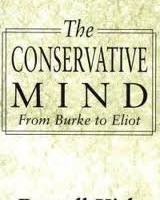Mark Twain and Russell Kirk against the Machine
Though neither an humanist nor a Christian—nor, for that matter, even a romantic in the vein of Blake who feared the “dark Satanic mills” of Industrial England—Mark Twain identified the late-nineteenth century fear of the machine run amok perfectly in his last novel, the tragically whimsical A Connecticut Yankee in King Arthur’s Court. One of the first to use time travel as a plot device, the story revolves around Hank Morgan, an engineer devoid of any poetry or sentiment. As his German last name indicates, he is the man of “tomorrow.” A practical man schooled in the servile rather than the liberal arts, Morgan can create almost any type of mechanism: “guns, revolvers, cannon, boilers, engines, all sorts of labor-saving machinery.” A materialist, he “could make anything a body wanted—anything in the world, it didn’t make a difference what; and if there wasn’t any quick new-fangled way to make a thing, [he] could invent one.” He was also, Hank assures the reader, “full of fight.” And, a conflict employing crowbars with one of his employees, a man named Hercules, results in severe blow to Morgan’s head, knocking him unconscious.
Read the complete article in The Imaginative Conservative
‘The Conservative Mind’ at 60, by Jeffrey O. Nelson
President Barack Obama’s decisive electoral victory this past November caused panic in some conservative circles. Questions about the continuing relevance of conservative first principles are common fodder for the chattering classes, both right and left.
But there is not much that is really novel in this latest conservative setback. Some 60 years ago, the chief role of conservatives was to resist and oppose, even as a Republican assumed the presidency. And almost 50 years ago, conservatives suffered an even more complete catastrophe at the polls.
One landmark book published in the spring of 1953 by a young Michigan State College professor began to change all that. Russell Kirk’s “The Conservative Mind” contributed to the re-imagining of American politics by countering the prevailing liberal narrative that there was no such thing as a conservative tradition in America.
Kirk did so by sketching intellectual portraits of key writers and statesmen from the 18th century to the present, each of whom had added to the deposit of conservative thought.
The 60th anniversary of Kirk’s book is a good opportunity to reflect on the prospects for conservatism today. For the past half-century, generations of conservative thinkers, journalists, and politicians have been moved by Kirk to confidently assert a new conservative vision. That vision was enough to elect presidents and congressional majorities.
So what does “The Conservative Mind” still have to teach a new generation struggling once again to find an authentic and convincing American conservative voice?
Below are a few ways in which Kirk’s book is more than a touchstone of a bygone era and instead remains a vital resource for conservative renewal.
Kirk was fond of quoting Napoleon about the power of the imaginative faculty. In the new world of electronic images, and now social media, the sway of abstract reason and discussion has declined and “the age of sentiments,” in Kirk’s words, has replaced it.
Kirk’s book was an extended exercise in the narrative application of imagination. He did not just outline an Anglo-American conservative genealogy, he imaginatively constructed, some say even invented, one.
What lingers with conservatives after reading Kirk is the striking impression of an encompassing spiritual standpoint; the disposition Kirk communicates is just as important as the particular arguments he advances. Well before today’s cognitive behaviorialists, Kirk understood that people are moved to act principally by feelings, intuitions and affections.
He also knew that such feelings proceed directly from thoughts, and so he set out to reframe popular thinking about conservative ideas in a positive way, and to elicit intelligent conservative action from his readers.
He often did so by evoking ideas expressed in literary and artistic works that appeal to the very sentiments Kirk believed conservatives were obliged to renew.
This approach is why optimism even in the face of defeat is so integral to Kirk’s vision. Kirk’s “imaginative conservatism,” as he termed it, still provides the best guide to constructing a positive vision that appeals to both mind and heart.
Successful conservative politics in America has always resulted from a balanced approach to economic matters and social concerns. The Clinton-era “It’s the economy, stupid” battle cry proved so tempting to business-minded conservatives that they adopted it with the aim to cast contentious social issues aside for good.
But in the face of events at home and abroad, conservatives are having to learn again that issues related to community and culture are the most intractable in politics. They will not go away. And seizing on the right social issues, with tact, is often what gives the conservative his winning edge in politics.
Strong social framework
Kirk championed a conservatism that embraced the dynamic economic power of markets within a larger, more stable social framework. Kirk believed that if the core institutions that comprise civil society — family, church, school, civic associations, hospitals, volunteer organizations — are strong and vibrant and left free from government interference to pursue their natural ends, then economic freedom would also flourish.
He also believed that economic prosperity would, in this arrangement, advance more evenly and with much less of the dislocation and disruption that has frightened the middle classes away from conservative policy positions in recent years.
Great Society-style politics may be booming just now, but studies demonstrate over and over that a bust is on the horizon. Conservatives have the opportunity—and the obligation—to prepare for the coming burst of the entitlements bubble by fashioning a compelling and workable alternative, which will inevitably rely upon economically independent and morally vibrant communities.
Kirk believed that a people flourish when their communities do. When civil society is strong, the national interest is advanced almost as a matter of course.
For conservatives to reclaim the allegiance of the middle class they will need to rise above the rhetoric of mere individualism, even as they resist, or turn back, the advance of the federal government in our lives. Conservatives will need to rediscover the language and policies of a political movement that puts communities first.
Robert Bork o dell’irriducibile fedeltà al vero, by Marco Respinti
Robert Bork è morto il 19 dicembre all’età di 85 anni ad Arlington, in Virginia, ma alla memoria di chi ha amore per la verità non mancherà mai.
Robert Heron Bork era nato il 1° marzo 1927 a Pittsburgh, in Pennsylvania, è stato giudice combattivo ed eminente giusperito, e i suoi nemici lo hanno odiato al punto di coniare per lui un neologismo, il verbo “to be borked”, ovvero vedersi precludere incarichi di prestigio per via mediatico-democratica. Candidato a diventare giudice della Corte Suprema, Bork fu infatti travolto dall’uragano di contumelie scatenatogli addosso dalla magistratura politicizzata a sinistra, dalla Sinistra politica e della stampa “progresssita” e “illuminata”.Per carità, avvenne tutto secondo le regole democratiche, ma è proprio in casi come questi che le regole da sole mostrano di non essere affatto sufficienti e la democrazia senza orientamenti morali sbanda.
Bork aveva infatti un grande, enorme difetto. Credeva in maniera tetragona nel diritto alla vita, nella famiglia monogamica eterosessuale e nella Bibbia piuttosto che a Charles Darwin, e non perdeva occasione per dirlo; ovvero, da uomo di legge e di cultura qual era, per mettere in guardia gli americani dai guasti che il relativismo sempre più imperante produce. Orbene, tutto ciò negli Stati Uniti fa di una persona sia un conservatore sia il bersaglio preferito dei cosiddetti liberal.
Tutto iniziò il 1° luglio 1987, quando l’allora presidente Ronald Reagan annunciò la decisione di proporre Bork alla suprema magistratura giuridica del Paese. All’epoca Bork era (sempre per nomina reaganiana) giudice della Corte d’Appello del Distretto di Columbia, dopo essere stato a lungo e onoratamente docente di Diritto nell’Università Yale, specializzato in norme antitrust, e avere avuto come studenti una pletora di nomi famosi, fra cui Bill e Hillary Clinton.
Reagan aveva però già commesso due “delitti” imperdonabili agli occhi dei liberal: nel 1986 aveva proposto William Rehnquist come presidente della Corte Suprema e il giudice Antonin Scalia come nuovo membro della stessa assise. Rehnquist era colui che nel 1973 aveva firmato il parere di minoranza contro la sentenza che, a chiusura del famoso, e famigerato, e basato su una frottola, caso “Roe v. Wade”, ribaltò improvvisamente, con un vero e proprio colpo di mano, le leggi a favore della vita umana nascente allora vigenti in numerosi Stati dell’Unione americana legalizzando l’aborto ovunque. Scalia era un altro noto campione del conservatorismo culturale e sociale, e per di più un cattolico integerrimo. Per la Commissione sulla Giustizia del Senato federale di Washington, l’organismo incaricato di vagliare le qualità professionali dei giudici indicati dalla Casa Bianca, permettere a Reagan d’inserire in quella formidabile squadra pure Bork fu troppo. E l’inferno si scatenò.
Fu Ted Kennedy ad appiccare il fuoco. Erano infatti trascorsi solo una manciata di minuti dall’annuncio della decisione di Reagan che il senatore Democratico del Massachussetts Ted Kennedy pronunciò un discorso inverecondo e strabiliante in cui affermò che con Bork alla Corte Suprema le donne statunitensi sarebbero state costrette ad abortire clandestinamente nei vicoli bui, che per le persone di colore si sarebbe riaperta la stagione della segregazione razziale, che i cittadini avrebbero dovuto guardarsi le spalle dagli agenti della “gendarmeria morale” e che tutti quanti avrebbero dovuto combattere quotidianamente contro una pervicace censura del “libero pensiero” degna di uno Stato totalitario.
Il discorso di Kennedy suonò la sveglia, e tanto i media quanto gli avversari politici di Bork scesero immediatamente in campo. La Commissione Giustizia del Senato fu subito lo strumento opportuno per fare la guerra a Bork, ma soprattutto a ciò che Bork (come Reagan) rappresentava in termini culturali e giuridici. La lotta fu senza quartiere e senza precedenti. Già non si poteva tollerare che qualcuno nutrisse la fede nei “princìpi non negoziabili” che animava graniticamente Bork, ma che poi questo qualcuno diventasse pure membro dell’organismo preposto a vegliare sulla costituzionalità delle leggi americane, e per giunta con la benedizione palese di un presidente “reazionario” e connivente, era, per un certo mondo, inconcepibile.
Read the complete article in La nuova bussola quotidiana


